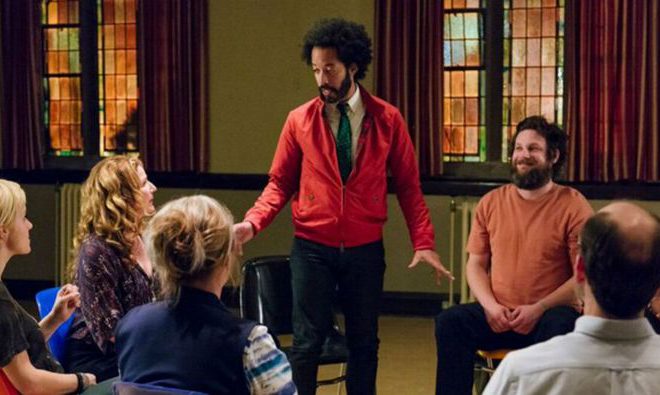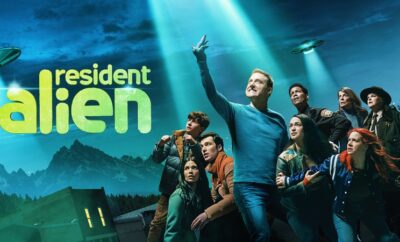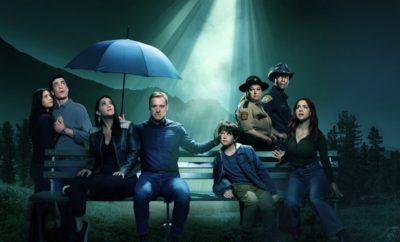
Interviews
Wyatt Cenac and David Jenkins – People of Earth
By: Anna Ruth Ramos
Let’s begin with you telling us a bit about People of Earth and the character of Ozzie Graham?
David Jenkins: Sure. When I wrote it, I thought it would be a fun idea. I wrote in my basement and in my kitchen. I was like, “Oh, this will be good. This will be a fun show.” I like writing about groups of normal people. I like that they might be struggling with something really big and complicated, in a giant Sci-Fi physique. I read about alien abduction support groups and thought that would be a good thing to set a show around. I took a crack at it, and it worked out.
Wyatt Cenac: I think, at least for my character in the show … My character is a skeptical journalist who travels upstate from Manhattan to spend time with a support group for people who claim to have had alien abduction experiences. He’s very wary, going in. He thinks it’s a group of weirdos, and then walks out afterwards thinking he might be a weirdo himself. (laughs). I think that goes to what David was saying as far as characters and looking at groups of people, that idea that … It’s very easy for someone to point and say, “Oh, well you’re weird, because you’re into this.” Once you spend a little time in that world, you realize, “Oh, there’s maybe something that makes me weird, too.”
I think that’s the fun thing. Even being at some place like this, like Comic-Con, where you can watch somebody walk around, it’s just like … “Wow, you really are going hard for Dr. Who. Who could do that?” And then you’re like, “Well, but I’m actually into Game of Thrones. Am I any different?”
David, did you go to any alien support groups? You said you heard about them, but where did you find out about them?
David Jenkins: I just read a lot about them. There’s a really good online community of people who have been abducted, or who have claimed to have been abducted. There’s a lot of really good chat rooms about it, and there’s good Facebook pages about it. There’s a decent amount of … This book Communion is great. They actually have a transcript from an alien abduction support group at the end of the book. It’s a surprisingly common thing. More than you would think.
What surprised you the most about reading those transcripts?
David Jenkins: What surprised me the most was the normality of it. It’s people who are just normal, and they said, “Something happened. I don’t understand it. I sleep with the lights on.” Everyone around the group’s like, “Mm-hmm (affirmative), yeah, lights on (makes woo gestures). I live in cities because I don’t want to be in areas that are dark, in the middle of the night.” The thing that struck me and impressed me the most about it is the vulnerability, to say “This thing is terrifying to me. It happened,” and have other people understand that and support it, to me, is really moving. I think it’s a pretty moving thing to tie a Sci-Fi … You can go in a lot of different directions that way. I think the most interesting direction to go in that way, is something really human, and tells smaller, personal stories, using this insanely over overwrought device of aliens, visiting Earth.
The series is only 10 episodes long. Did you find that constraining for the story-telling, or was that a good frame-worked approach for a first season?
David Jenkins: I think it’s a good framework. I think you have to make it fit, and once you get your head around the episodes, the story scales itself to that. I definitely would love to have more story than episodes, instead of the opposite. It feels like it’s a good number, and it leaves enough that you can end it with some gas in the tank, for if we were lucky enough to get a Season 2.
How did you pitch the show to TBS?
David Jenkins: I wrote it and I sent it to David Kissinger and Larry Sullivan, who work at Conan O’Brien’s production company. It was like, “Hey, I’m writing this thing. I don’t know if you guys are interested in it.” They read it and they liked it. They gave it to Conan, and he read it, he liked it, which is crazy to me. Greg is friends with Conan, and I sold the idea as a Greg Daniels style human comedy, mixed with the J.J. Abrams Magic Box show. Greg was interested in it and wanted to do it. I think it’s much easier to pitch something from my perspective if you have a script, and you’re like, “This is what it is. It’s not going to be something totally different. Here’s the idea, you can read it. If you like it, great. If not, that’s fine.”
I think the pitch was really just telling people it’s an alien abduction support group, and it turns out that we dismiss them, but on some level, we find out that they are actually right. There are aliens. There’s so many ways that idea can be … Any idea, really. It’s a flighty idea. There’s so many ways it can be bad, or not work. Even writing it, I was like, “I don’t know if that’s going to work,” so actually having the script and having them read it, after that pitch, was the plan of attack there, for me.
Wyatt, how did you get involved in the project?
Wyatt Cenac: I got involved because David … When he wrote the scripts, he had said that he had thought of me for the role, and so they reached out to me, and I read it. I met with David, and we talked for a while about it, and what he wanted the show to be, and it seemed he was very passionate about it. I know Greg, as well. Greg and I have worked together at King of the Hill. It seemed like a good group of people, and they all seemed very passionate about something, and that’s what you want. You want people to be into the project.
What went through your mind the first time you read the script?
Wyatt Cenac: When I first read it, I think the first thought was, “Oh, it’s cool that it’ll shoot on the East Coast, because I don’t really like to travel. (laughs). Beyond that, it was a very sweet story. It was funny, but there was also something sweet and real underneath. Some of what David was saying, there’s no real manual for being human. We all try to understand it in our own way. As we do that, you want other people to connect with. And you want other people to feel like, “Okay, I’m doing humanity right, because these people think the same way I do, or they have the same issues I do.” That interest in trying to tell stories, that promote a sense of empathy in the viewer among the characters, and that’s what seemed interesting, it seemed like it would be a cool thing to try to be involved with.
How did you like working with the whole cast? It’s a bunch of comedians …
Wyatt Cenac: There were a lot of comedians, and it’s a very talented group of people, and I think what’s nice is that it’s been an incredibly relaxed environment, that … We’re doing the script, but there is room to play. What’s nice is you can throw something at somebody, and whether it’s going off script with Ana, or just watching somebody like Brian Huskey goof off for a while. You have the freedom to do that. Even in the way that we’re shooting it, we’re trying to shoot it in much more practical sets where … It’s not a set where the walls slide out so we can move lights in, and do all that. It’s, no, let’s try to build a real room, so that we can all be in this space, and interact in that space and not feel like, “Oh, I can’t run over there, because there’s a C-stand in the way.”
Which of the characters were you most excited to find out about their back story? Was there any that stood out for you?
Wyatt Cenac: There’s Alice Wetterlund’s character, Kelly, is an interesting character because she seems to be a person who is unlucky in love and life, and is that person that may be in a state of arrested development, that you feel like when you read her character, it’s like, “Oh, you should leave this town. You’ve got so much more, but what’s keeping you here?” Trying to figure out what’s keeping her here, and Ana’s character, as well. There’s something that’s really interesting with Ana’s character. She’s a somewhat failed, not-so-great therapist, who has taken charge of a therapy group, but a therapy group that no other therapist would theoretically want to touch. (laughs).
I think there’s something that’s fun in that, of just even watching her character explore that. What’s kind of fun, and it seems like we’re exploring this idea that, here’s this woman who thinks of herself as an expert, but to the rest of the counselor community, they might see her as a joke, but to the people in that room, they may take what she says seriously, and just that balance of things. There’s something no one ever thinks about, other than psychiatrists and things like, “All right, they have home lives that they go to where they’re probably dysfunctional in their home lives,” and there’s something nice about seeing that being played out with these characters, and with somebody like Ana’s character.
We’ve heard that we see the aliens at some point. How did you come up with the look of the aliens?
David Jenkins: It was challenging. The thing was just to stick to what’s existing, so there’s … Gray’s are normal, like giant-eyed gray aliens. And then there are Reptilians, who are snake people who can disguise themselves like humans. There’s also these tall, long-haired aliens called Nordics, or Whites. They’re supposed to be very tall and very empathic, and very light-skinned. In a way, it’s using what’s actually out there to dictate it, but for the look of Jeff the Gray, Greg Daniels sketched something on a cocktail napkin, almost kind of a thing. We ended up using that for the look of it. And he’s …
Wyatt Cenac: He looks like a cocktail napkin.
David Jenkins: He looks like a cocktail napkin, yeah. You’re going to be very disappointed …
Wyatt Cenac: Actually, maybe he’ll love it. He’ll love it. It’s a giant cocktail napkin with a drawing on it.
David Jenkins: Yeah. If you like minimalism, and very hard art films, you’ll love this.
So there are different types of aliens, though, that we see. Right?
David Jenkins: Those are the three. I think you get in a little bit of trouble when you start going, “We can do anything! This one’s purple and he flies!”
Do you believe there is alien life out there?
David Jenkins: Yes. I do. I think that, “Why not?” Why wouldn’t there be? I don’t see a reason why there shouldn’t be.
Wyatt Cenac: I’ve been asked it a bunch, so I will give you my stock answer, which is that it’s a fairly arrogant position to assume we are the only beings out there. Maybe we are, but that feels like living in a forest and assuming that there aren’t any cities outside of that forest, and that there aren’t people in those cities, maybe they’re aliens, maybe they’re not. Maybe they don’t necessarily look like us or look humanoid. Maybe they’re small, microscopic things. Maybe they’re beyond our view, or larger than we think. My own point of view would allow me to think, “I can’t believe we’re it and we’re the best the universe has to offer.”
Which of the three aliens from People of Earth would you most like to meet?
Wyatt Cenac: None of them. They’re all disgusting! I want to meet some of those Captain Kirk lady aliens that he winds up getting drinks with. (laughs). That’s who I want to meet.
David Jenkins: 60s Star Trek.




You must be logged in to post a comment Login